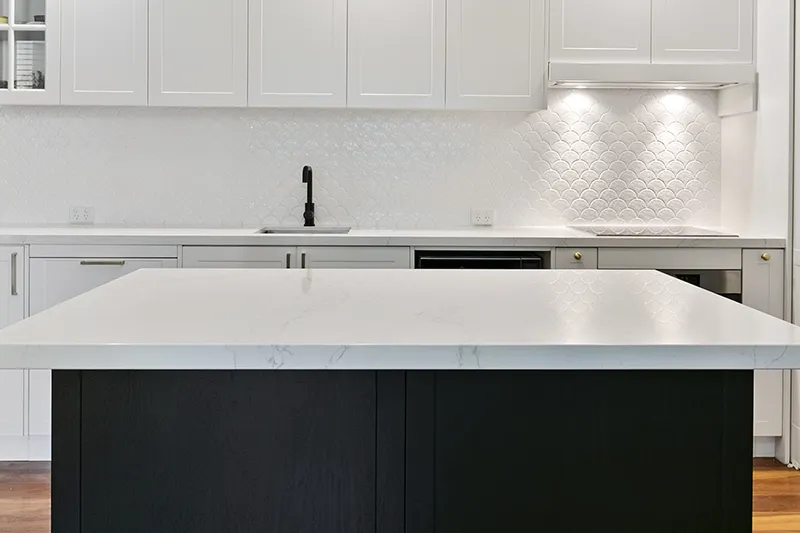Did you know your kitchen is one of the most used rooms in your home? It’s where you spend the most time with your family, prepare every meal, and host your guests. Because of that, it should be a space that is both practical and aesthetically pleasing to the eye.
Within your kitchen, your benchtops make up a significant amount of the available space. Plus, they’re the spot where most of the chopping, pouring, and mixing happens. This means your benchtops have a significant influence on both the look and functionality of your kitchen, so the materials you use for them are important. You need something tough to stand up against the wear and tear of day-to-day activities, while still being stylish and sleek.
Let’s investigate some of the best materials you could use for your kitchen benchtops.
Top 5 materials for your kitchen benchtops
1. Stone kitchen benchtops
Stone is one of the most popular materials out there – and for good reason. Every slab is unique with a polished, modern aesthetic, that brings luxury to every space. With its durability and low-maintenance cleaning, you can maintain this look for years, especially when the stone is sealed to build up resistance.
Choosing the type of stone you want will depend on your budget and your vision. Marble kitchen benchtops are a popular choice due to their distinct, elegant style. Since they come in a variety of colours, patterns and veins you should have no problems finding the look you want. The only thing to consider is that it is a softer material than some of the other benchtop materials on this list, so something like granite could be better if you’re seeking some extra durability for your stone kitchen benchtop.
Granite is harder than marble, with the same variety of colours and styles. It has a great visual appeal and should be easy to match with your existing colour scheme. It is also more affordable than marble, and less porous, which means it’s more stain and scratch-resistant.
Regardless of the option you choose, stone kitchen benchtops are a great addition to any home, and easy to wash with warm water and a wipe.
2. Laminate kitchen benchtops
An excellent, budget-friendly option, laminate benchtops come in a wide range of colours and finishes, and can even mimic other materials. This means you can achieve a marble or other stone look at a reduced expense while emulating their polished luxury.
Plus, this economical and versatile material is water, impact, heat and stain resistant, making it easy to clean and extremely durable.
3. Stainless steel kitchen benchtops
With their hard-wearing and hygienic nature, these kinds of kitchen benchtops are typically used in restaurants. However, in recent years they have become more and more popular for residential use, both for their practicality and industrial chic.
With no cracks for germs to form in and a low chance of staining, they are a great option for big family kitchens that might suffer from extra wear and tear. You can even integrate your splashback and sink into your stainless steel benchtop, extending its durability and easy cleaning, or even just use it on your kitchen island.
4. Solid surface kitchen benchtops
Solid surface is a common benchtop material that mimics stone but is man-made. It is quickly rising in popularity due to its flexibility, versatility and endless application potential. With its non-porous nature, solid surface is stain and scratch-resistant, making it extremely low maintenance and hygienic. It is also very tough and, as the name suggests, solid, so it will hold up well over time. It also contains no silica, meaning there is no risk of silicosis to fabricators during fabrication and install. Some of our Nationally Approved Suppliers have examples of solid surface benchtops, including Caesarstone’s ‘Porcelain’, CASF’s ‘Corian’, Polytec’s ‘Xenolith’ and Nover’s ‘Evostone.’
5. Timber kitchen benchtops
As a kitchen benchtop material, timber is often a less frequently selected option, but it’s still one to take into account. Its use can create a rustic appeal, and it looks great when contrasted with steel or glass. Plus, because it’s available in a range of shades, it’s easy to find the right kind to complement your existing kitchen elements. Walnut, oak, beech, or even bamboo are all worth considering, with bamboo in particular on the rise thanks to its neutral colour tones and visual appeal.
Though timber is softer than other materials on this list, scratches and nicks can actually add to its charm. Even then, it’s a simple matter of sanding and resealing it every few years to leave it as good as new.
Talk to DDK about your kitchen benchtops
At DDK, we work closely with manufacturers to produce quality kitchen benchtops that complement the vision you have for your home while offering ideal functionality. Check out the range of materials we have available today, and get in touch with us to discuss your kitchen benchtop ideas and how to implement them in your kitchen.

